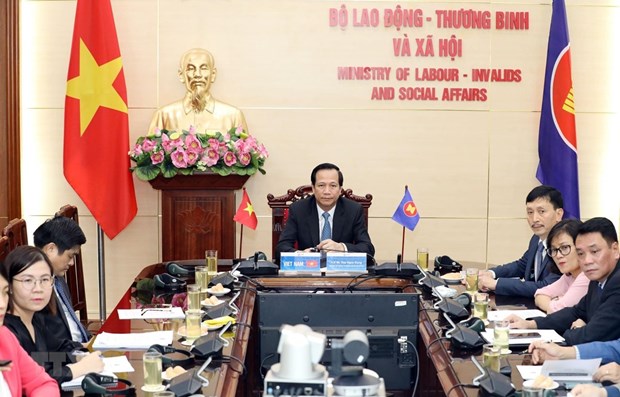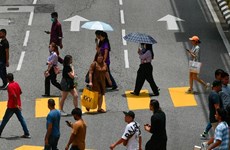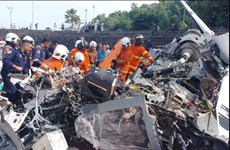ASEAN+3 commit to enhancing cooperation in developing human resources
 Ministers and head delegates of ASEAN members and heads of delegations from three partner countries at the ALMM +3(Photo: VNA)
Ministers and head delegates of ASEAN members and heads of delegations from three partner countries at the ALMM +3(Photo: VNA)Hanoi (VNA) – ASEAN+3 countries have committed to enhancing cooperation towards building a flexible and resilient workforce for the Association of Southeast Asian Nations (ASEAN).
Vietnam, as Chair of ASEAN in 2020, hopes that cooperation among ASEAN members and between ASEAN and ASEAN+3 partners will be constantly strengthened in order to develop a workforce that is competitive, resilient and flexible for ASEAN.
Addressing the 11th ASEAN+3 Labour Ministers’ Meeting (ALMM Plus Three) on October 28 afternoon, Minister of Labour, Invalids and Social Affairs Dao Ngoc Dung appreciated the effective coordination among ASEAN member countries in working together with Vietnam to draft and pass the ASEAN Declaration on Human Resources Development for the Challenging World of Work and a roadmap for implementing the declaration.
Vietnam commits itself to join efforts with ASEAN members for the effective implementation of adopted declarations, the minister said.
The 11th ALMM+3 was chaired by Indonesia, and attended by ministers and heads of delegations from ASEAN member countries and three partner countries – China, the Republic of Korea and Japan.
At the meeting, ministers shared viewpoints and presented proposals to enhance the competitiveness and resilience of workers in ASEAN, as well as affirmed commitments to continue driving forward the collaboration between ASEAN and the three partners.
The Vietnamese delegation has made active contributions to discussion at the meeting. As head of the delegation, Minister Dung welcomed the meeting’s theme of “Promoting the competition, responsibility and flexibility of ASEAN’s labourers in the future of work”, which he said was relevant to the theme of the ASEAN year 2020 under the Chair of Vietnam.
He said contributions under the theme will be very useful for the building of capacity and preparations to help ASEAN workforce be able to keep their jobs and quickly and effectively cope with changes in the world of work.
Minister Dung said in the case of Vietnam, human resources development is one of the three strategic breakthroughs defined in the Socio-Economic Development Strategy for 2011-2020. Through the implementation of this strategy, the ratio of labourers certified to have taken training courses rose from 15.58 percent of the workforce in 2011 to 24 percent in 2019. The ratio is estimated to reach 25 percent in 2020, fulfilling the set target. Vietnam was also rated high in the region regarding several human resources indexes such as the human capital index, innovation index and human development index. The country is working on a human resources development strategy for 2021-2025, which is expected to focus on developing human resources adaptive to the Fourth Industrial Revolution, according to the minister.
Minister of Labour, Invalids and Social Affairs Dao Ngoc Dung speaks at the ALMM+3 (Photo: VNA)
Considering the challenges and opportunities of employment for labourers, participants at the ALMM+3 agreed to continue working together to strengthen positive policies on the labour market so as to stimulate employment and enhance occupational safety and hygiene standards in the region. They also voiced a commitment to promoting closer collaboration between ASEAN member countries and the Republic of Korea, China and Japan for raising the flexibility and resilience of their workforce, in anticipation of future social and economic crises.
The negative impacts of the COVID-19 pandemic on employment and welfare of labourers in the region require ASEAN member countries to improve the effectiveness of their cooperation. Besides, ASEAN is focusing on preparing its labourers for returning to work in a safe manner.
The 11th ALMM+3 adopted a joint statement, and agreed to convene the next meeting in the Philippines in 2022./.












